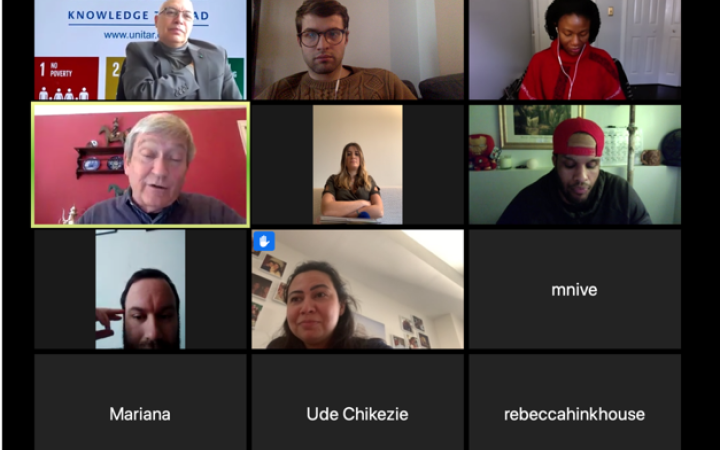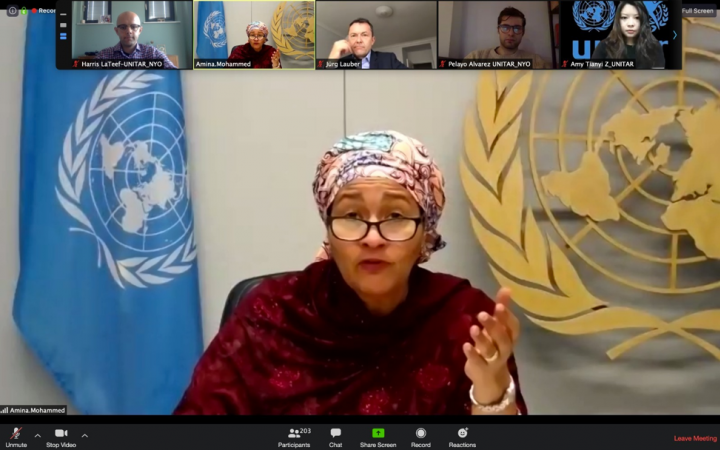Introduction
4 June 2020, New York City, USA – During the past two months, the UNITAR office in New York has successfully maneuvered the complexity of the COVID-19 situation, and it has been continuing its delivery of high-quality online training programmes such as:
- Global Diplomacy Initiative (GDI) programme
- two interactive training programmes in collaboration with the Columbia Law School
- first module of the training series in preparation for the General Assembly’s 2020 Quadrennial Comprehensive Policy Review (QCPR)
- ‘Defining Transformation: A Global Food System’, co-hosted with Emerging Ag
- ‘A Better Planet: Pathways to a Sustainable Future’, in collaboration with the Yale School of Forestry and Environmental Science
Overall, UNITAR reacted swiftly to the changing conditions by transforming all its programme into an online format, and the influence of its training has reached over 600 participants.
Global Diplomacy Initiative (GDI) programme
One of the many events that continued despite the COVID-19 disruption was the Global Diplomacy Initiative (GDI). This is a flagship programme of the UNITAR office in New York that provides young professionals with the opportunity to learn about diplomacy from diplomats themselves.
On 13 March 2020, the first video conference training took place, and was moderated by Dr. Angel Angelov, First Secretary at the Permanent Mission of Bulgaria to the United Nations. The GDI programme then carried on with online training on ‘Women, Peace and Security’ and ‘Responsibility to Protect (R2P)’ administered by Ms. Jelena Pia-Comella, current Managing Coordinator of the Support Office of the Global Action Against Mass Atrocity Crimes (GAAMAC).
On 17 April, the GDI programme concluded and GDI students, UNITAR staff, and the day’s special tutor, Mr. Larry Johnson, an adjunct professor of law at Columbia Law School and former UN Assistant Secretary-General in Legal Affairs attended the closing ceremony. Mr. Marco Suazo, head of the UNITAR office in New York, closed the event by thanking the participants for their overall interest in understanding the United Nations and multilateral diplomacy.
Two interactive training programmes in collaboration with the Columbia Law School
‘Gender Equality in Peace Building and Conflict Resolution’ workshop
On 22 April, UNITAR implemented another workshop entitled ‘Gender Equality in Peace Building and Conflict Resolution’ in collaboration with Professor Alexandra Carter, Director of the Columbia Law School Mediation clinic and her co-collaborators Jessica Barragan, Jacquellena Carrero, Jamie Chang, among others. Over 150 participants attended the interactive workshop which emphasized the United Nation’s Sustainable Development Goals 5 &10, pertaining to Gender Equality and Reducing Inequalities through efforts on increasing gender parity.
‘Steer Any Diplomatic Conversation by Asking the Right Questions’ workshop
Another fruitful collaboration between UNITAR and Columbia Law School was the ‘Steer Any Diplomatic Conversation by Asking the Right Questions’ online workshop. This workshop focused on the United Nation’s Sustainable Development Goals by providing UN delegates with a practical guide on how to direct diplomatic conversations, a necessary skill in achieving the 2030 Agenda. Professor Alexandra Carter, Director of the Columbia Law School Mediation Clinic; and her co-collaborators Jessica Barragan, Audrey Chao, among others delivered the session.
Quadrennial Comprehensive Policy Review (QCPR) training series first module
A few days after the success of the Columbia Law School workshop, UNITAR launched the first module of the training series in preparation for the General Assembly’s 2020 Quadrennial Comprehensive Policy Review (QCPR). This online event included high-level speakers such as Ms. Amina J. Mohammed, the Deputy Secretary-General; Mr. Peter Messerli, the Co-chair of the Independent Group of Scientists 2019, and Co-author of the Global Sustainable Development Report; among other experts and UN officials. The QCPR training module 1 was a thriving collaboration between UNITAR, UN DESA, and the Permanent Mission of Switzerland. Module 1 reached more than 200 participants from the Member States and UN entities.
‘Defining Transformation: A Global Food System’ workshop co-hosted with Emerging Ag
On 18 May UNITAR in collaboration with Emerging Ag, hosted the workshop ‘Defining Transformation: A Global Food System.’ This was the first event of six in the Food Systems Series leading up to the 2021 UN Food Systems Summit. One-hundred-fifteen participants joined through video conference to interact with the following panelists: Ms. Robynne Anderson, President of Emerging Ag; Mr. Zachary Bleicher, Food and Nutrition Advisor at the Executive Office of the Secretary-General; Ms. Lindiwe Sibanda, Co-Chair at the Global Alliance for Climate-Smart Agriculture among other experts and UN officials. The topics covered ranged from the importance of urban and rural agriculture to the significance of protecting the planet while producing food. The interconnectivity of the Sustainable Development Goals (SDGs) and the importance of food security to all 17 SDGs was also mentioned.
‘A Better Planet: Pathways to a Sustainable Future’ workshop in collaboration with the Yale School of Forestry and Environmental Science
The most recent online workshop, ‘A Better Planet: Pathways to a Sustainable Future,’ was a collaboration between UNITAR and the Yale School of Forestry and Environmental Science. This webinar, attended by 180 participants, sought to bring awareness of climate change and the challenges it presents. The panelists that participated were Ms. Indy Burke, Mr. Ashton Mark, and Ms. Marian Chetrow professors at Yale School of Forestry & Environmental Studies; Thomas E. Lovejoy a University Professor of Environmental Science and Policy at George Mason University among other experts and UN Officials.
Conclusion
Throughout these events, the UNITAR New York office has demonstrated its versatility facing uncertainties. These online trainings have transcended geographic boundaries and have received positive feedback from its participants. Moving forward, the UNITAR office in New York will closely monitor the situation, and will keep creating and hosting informative sessions to benefit the diplomatic communities, UN personnel, scholars, and interested individuals.



